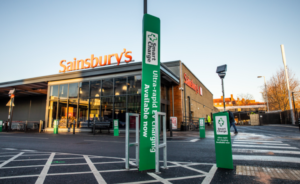Mayor confirms April 2019 start for London ULEZ
The Mayor of London, Sadiq Khan, has announced that the Ultra Low Emission Zone (ULEZ) in central London will come into effect from 8 April 2019.
The ULEZ will further toughen emissions standards in the capital, with petrol cars, vans and minibuses required to meet the Euro 4 standard, whilst diesel vehicles will be required to meet the latest Euro 6 standard in order to avoid a charge of £12.50 per day.

The ULEZ will come into effect in Central London first from 8 April 2019
This will replace the T-Charge which was launched last month — a £10 emissions surcharge on top of the Congestion Charge which takes effect during peak hours on weekdays. Once in effect the ULEZ will operate 24 hours a days, seven days a week.
From April 2019, the ULEZ will incorporate two charge levels: £12.50 a day for cars, vans and motorbikes and £100 a day for lorries, buses and coaches.
These charges will be in addition to the Congestion Charge, so the more polluting cars and vans would pay £24 per day and lorries would pay £111.50 during C-Charge hours.
Revenue
All revenue raised will be used by Transport for London to help maintain a greener transport fleet and reduce pollution across the transport network, according to City Hall.
According to the Mayor, up to 60,000 vehicles every day will be impacted by the introduction of the ULEZ, compared to the estimated 6,500 a day affected by the T-Charge.
Diesel vehicles that do not meet the Euro 6 standards and most petrol vehicles that do not meet the Euro 4 standard will be eligible for the charge. Broadly, a four-year-old or newer diesel car will meet the requirement in 2019 when the scheme comes into force.

The initial area proposed to be included in the ULEZ from April 2019
The Mayor of London, Sadiq Khan, said: “London’s lethal air is one of the biggest health challenges of this generation. We can’t continue breathing in air so toxic it harms children’s lung development and causes chronic illness and premature death. I am determined to take the bold action needed to address this scourge once and for all.
“So I am pleased to confirm that from 8th April 2019 — 17 months earlier than planned — stricter standards for diesel vehicles will apply 24/7 across central London. This builds on the success of the T-Charge and is part of my comprehensive plan to clean London’s air.”
“I’ve taken the bold action we need to protect our children, but we now urgently need the Government to step up and provide the support to Londoners and businesses required to help them meet these crucial standards.”
Planning
TfL’s director for city planning, Alex Williams, said: “We are moving quickly to implement the Mayor’s bold proposals to improve air quality in the Capital. Bringing forward the introduction of the central London ULEZ was popular with the public in the consultation and will be pivotal in dramatically reducing harmful emissions. It also gives drivers and businesses the certainty they need when deciding to buy new vehicles, as well as being a catalyst for people to make more sustainable travel choices.
After its initial implementation in central London in 2019, the ULEZ is expected to be rolled out further across Greater London for heavy diesel vehicles, including buses, coaches and lorries in 2020, and up to the North and South Circular roads for cars and vans in 2021.
Despite having been welcomed by air quality campaigners — some of whom feel that the measure should be brought in quicker — the introduction of the ULEZ in 2019 has been met with concern from fleet operators, some of whom feel that the measure would effectively ‘scrap many modern and expensive vehicles well before their time’.
Efforts to tackle emissions in the UK’s towns and cities will be among the issues tackled at the National Air Quality Conference in London on 23 November. To secure your place, click here.
















